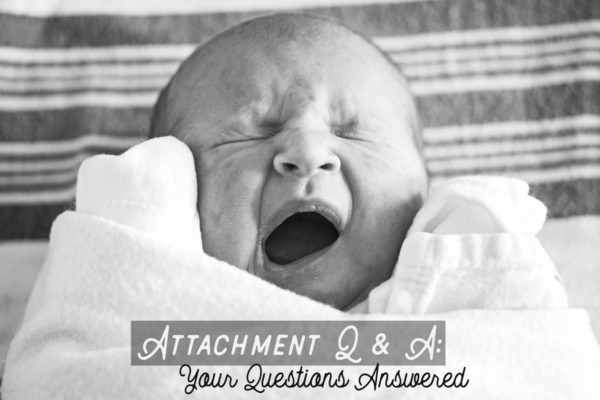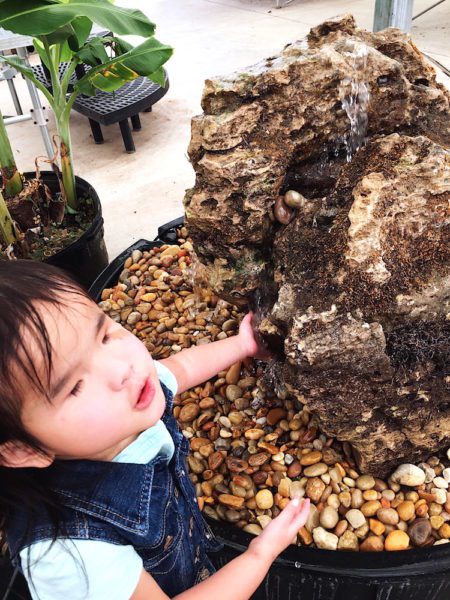Attachment. Not much more could not be packed into one single word, especially in the adoption world.
We spent all of July focusing on this most-important topic and decided to continue into August – but with a bit of a twist.
This month, we’re answering your attachment questions. Because we all have them – we just don’t always have a safe place to ask.

Question:
So much of what I read about attachment talks about loving eye contact. Our son, adopted at 6, is vision impaired. He doesn’t like to be touched. What are some ways to build attachment that work around these problems?
A great deal of professional attachment advice circles around the use of eye contact. But what happens when your child is blind? I’m coming from the viewpoint of a three-timer adoptive mom. Two of my Chinese kiddos were born without eyes.
Eye contact is not necessary for attachment. I felt that my daughters attached to us very quickly. They had to in a way because they needed us for everything, much like an infant would. So, we bonded over droppers of water, nighttime feedings and feeding them bite by bite.
I think feeding is one of the best bonding and attachment exercises we can use. Number one, cook them food they enjoy sometimes! Don’t limit them to our pizza and cheese laden casseroles. Break open the seaweed and offer it to them in your hand.
Beyond feeding them and basic care I think these pieces are important to remember when adopting a child who is blind.
Language:
Remember that they are, in fact, blind. That means that all information you are taking in through your eyes, they are trying to take in with other senses. Imagine being in the middle of trauma and trying that. It isn’t easy! Make sure you verbalize everything, every tiny detail. If you are making them toast in the morning then say, “The bread is on top of the fridge. I am getting it down and putting it into the slots in the toaster. A toaster will cook it and make it crispy. Do you like crispy, crunchy things?” Everything. Say everything!
If you leave a room, make sure you tell them. When you walk in the room, say “It’s just me, Mama.” You words give them the information they need to assess the situation quickly and decide if they are safe and can relax. You want them in a state of relaxation to work on attachment.
Smells:
My girls are quick to notice smells and changes in smells. For the first while, when building attachment, I recommend not changing perfumes, shampoos, or lotions. They are learning to recognize you and changing that up we personally found would throw them into regression. Not worth it.
We also utilized essential oils and diffusers. We kept the house smelling the same so that it gave them a sense of safety when they came home and smelled that they were home. You could use candles as well.

Touch:
This can be tricky. I think touch is absolutely one of the most important ways to build attachment. Some kids are resistant to touch. We had a social worker tell us to start small. Start with your hand being near theirs, feet near each other while sitting on a sofa together. If your child is resistant, do not force touch. That can be incredibly scary. Find ways that they will allow it and use it.
For my son, who isn’t blind but hated being touched, he would brush my hair and let me get behind him and comb his. So, we did that every single day. Four years later he still asks for this.
My girls loved being touched. I wore one in a carrier for months. But this is incredibly important to remember. Verbally tell them you are going to touch them! They can’t see your hand coming and it jolts them. Just learn to say, “I am going to put my hand on your shoulder now. Is that okay?” I still make this mistake sometimes! Just the other week, I was in a rush and put the Sunday School sticker on my daughter’s back without telling her. And down she went into a total meltdown!
Use deep pressure and not light touches. Light touches feel like a spider crawling on your skin! Touch firmly and it will usually go over much better for you.
Time:
I see so many new adoptive parents home, panicking about attachment. I’m sure I was one of them after my first adoption. But the thing is, attachment takes time. It is the accumulation of hundreds of small events that teach our children we are trustworthy. It takes scraped knees and being taught that mamas were made for kisses and bandaids. It takes midnight snacks to remind them that food is always here. It takes crying together and being angry. It takes watching their mama stay up late at night to finish a Halloween costume. It takes watching their daddy build their new bed for them.
Attachment is not a magic pill. It is not a sprint. This is a marathon. And sometimes the only attachment I feel all day long is my own. I love them because they are mine. I choose them every single day. And one day, I hope and pray, they will choose me back.


























Thanks! Is the child pictured from Zhanjiang, by chance?
My son, home 6 months, is overly attached in that he has anxiety when I’m not in ear shot. He constantly thinks I’m going to leave him. He refuses to walk by himself with his cane because he doesn’t want to let go of me.
He’s also constantly smelling me. He puts his nose right on my skin and hovers over me while he’s doing it. This really bothers me. I don’t mind him smelling me, but hovering over me is like nails on a chalkboard. Is this is equivalent to eye contact for a blind child?
Thank you for sharing this.
I wanted to share a remarkable family with you, as well. This family is Deaf and they have a daughter (biological), Clarissa, who was born deaf and blind. It is fascinating to see all they have done to help her attach and connect with her world, without sound and sight. Maybe some of their techniques would be beneficial for others.
https://www.facebook.com/ClarisaVollmar/?hc_ref=ART4Ww1s4QSCQnPL6ZaX21v0wf5Ep0YWP6rm6hPFKjWqIAD4XzziY_NGa1AbO-AeiWs&fref=gs&dti=815097448622353&hc_location=group